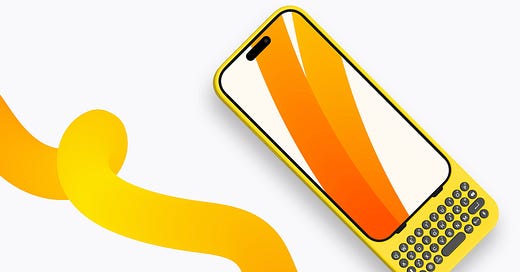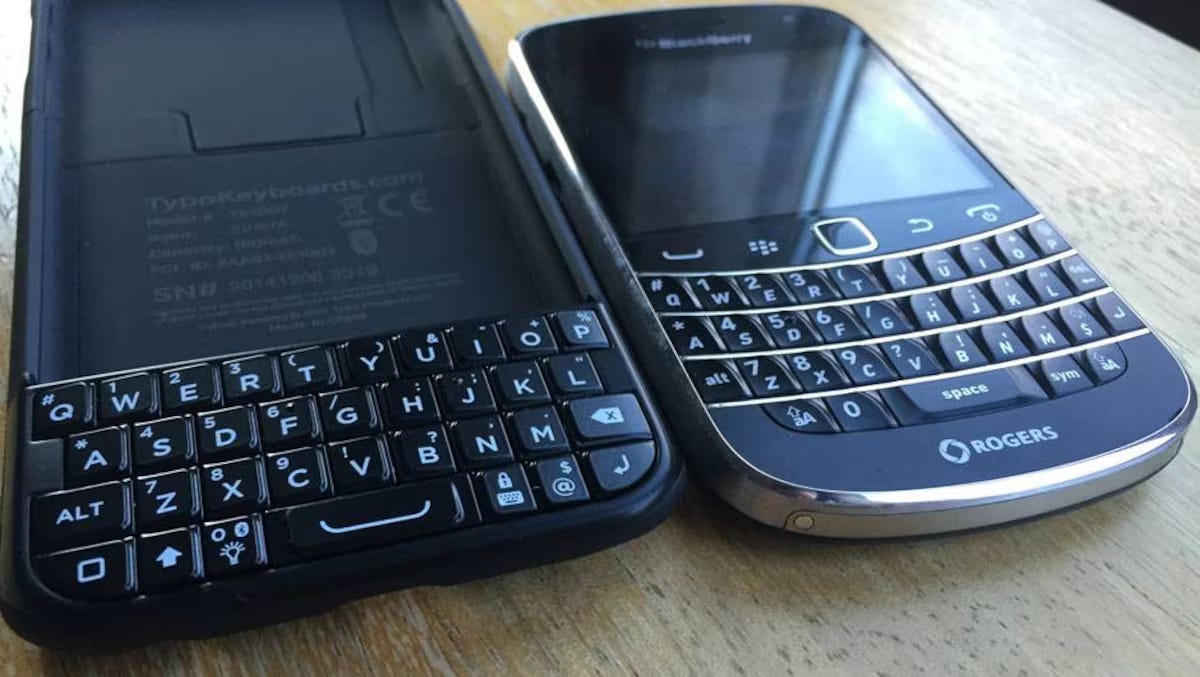Gen Z, nostalgia and timing could create a perfect storm for Clicks to succeed where Typo couldn't
Clicks is a new startup making physical keyboards for the iPhone. Here's why you might start seeing them everywhere.
Hey, remember Typo?
I’m guessing many of you don’t. That’s because Typo was a flash-in-the-pan iPhone accessory maker in 2013 that attached a physical BlackBerry-like keyboard to the bottom of the phone. The company was co-founded by Ryan Seacrest, who came up with the idea because he really missed his BlackBerry keyboard after switching to iPhone.
Typo was flawed from the start. You had to charge the case to use it, iOS didn’t always play nice with it, and it had a learning curve for people after they got used to a digital keyboard, among many other things. Plus, while having a celebrity like Ryan Seacrest was helpful for media exposure, his audience was too broad to influence meaningful sales numbers.
There was a second-generation Typo 2 that came out to help fix some of the problems (I reviewed it for The Globe and Mail back in 2015), but it still had a larger problem in that BlackBerry sued for patent infringement and eventually killed the company.
Fast forward to last week — or about 10 years after Typo —and a new company called Clicks is making a physical keyboard for the iPhone. However, when you look at the consumer macro environment, the team involved with the company, and who they’re targeting, things are quite different this time around. Clicks could very well succeed where Typo failed.
The right timing
We’ve been talking about nostalgia in consumer trends for a while now. In 2022, I wrote about the digital generation going analogue for the Financial Post. But long before that, vinyl records started making a comeback (here’s an article I wrote in 2014 for The Globe), and then we saw cassette sales soar, CDs are spiking, film cameras resurging, and companies like Samsung have brought back flip phones for the modern age.
These are just a few examples, but there are many others out there. With all of them, the common trend usually involves younger people with disposable income today buying these older products because they were either too young to use them the first time or weren’t even alive for them.
This was one of the problems with Typo: it came out within the first few years of BlackBerry’s collapse, meaning it targeted the same people who had just recently decided to stop using physical keyboards and tried to convince them back with an inferior product.
But Clicks has the benefit of time on its side. Many smartphone users today never had a cellphone with a physical keyboard, and they keep hearing about the glory of the BlackBerry days (including through a widely released movie). Analog and old tech are already fashionable to them, so why not try a relatively inexpensive way to test out this physical keyboard thing they’ve heard about growing up?
The right features
When Steve Jobs introduced the iPhone in 2007, he first highlighted how the physical keyboard was a waste of physical space on phones and that an on-screen touchscreen, which appeared only when needed, solved that problem.
But a lot has changed with smartphones since then. The screens have gotten much larger, apps have become more complex (not to mention the emphasis on photos and video), and the users are younger than the business folk or early adopters of the first iPhone.
Clicks says the value in its keyboard for the user is in how it frees up valuable screen space for modern mobile apps, which is the opposite of what Steve Jobs said many years ago. The company is positioning it as “the first creator keyboard for iPhone,” which also falls in line with targeting young smartphone users craving older tech. They live-stream videos and chat with their viewers on screen while doing it. They consume influencer content and create their own. "With Clicks,” the company says, “nothing gets in the way of your content.” Clever.
Other features smartly target younger, savvy iPhone users, too. Instead of focusing on shortcuts for making phone calls or business-use cases like Typo did, the keyboard focuses on quick access to the latest iOS shortcuts for scrolling the web, Spotlight searches, emoji, and much more. It isn’t targeting people who used to love BlackBerry; Clicks is targeting iPhone power users.
Then there are the physical components of the accessory: it can easily slide on and off, you don’t need to charge it, and it comes in bright colours to stand out in a crowd. Clicks is positioning itself as something that makes a visual statement, which is exactly what Gen Z loves in their products.
The right founders
Don’t get me wrong, Ryan Seacrest was huge when he released Typo. It was peak American Idol, after all. But his audience was casting too wide of a net for them to care about a specific use-case iPhone accessory, and the internet hadn’t yet entered the phase of niche-focused influencer content.
But Clicks has an impressive starting lineup of founders who can bring in key demographics and the right technical backgrounds.
For example, Michael Fisher (aka Mr. Mobile) has over 1.2 million YouTube subscribers who care specifically about his opinion on the latest mobile technology. Kevin Michaluk (aka CrackBerry Kevin) ran one of the internet’s largest BlackBerry enthusiast websites, so his audience is an excellent mix of both old-school BlackBerry fans and new tech adopters. Clicks also has on board one of the original designers of the BlackBerry Bold, plus someone who spent 10 years at BlackBerry and 10 years at Apple.
Needless to say, it feels like there is a healthy mix here of industry influencers, product knowledge and business experience for a solid foundation.
Success still isn’t guaranteed
Make no mistake, I’m not making the case here for why Clicks will see widespread adoption. But I do think if anyone could make a physical keyboard for iPhone succeed, Clicks could be the company to do it.
The timing is right when it comes to retro tech being adopted by a younger generation, technology in general has evolved and improved since the last major attempt (aka Typo), and the founders have a large following with a hyper-focused interest in the product category.
They also don’t have to worry about BlackBerry suing for patent infringement and putting them out of business, which helps.






